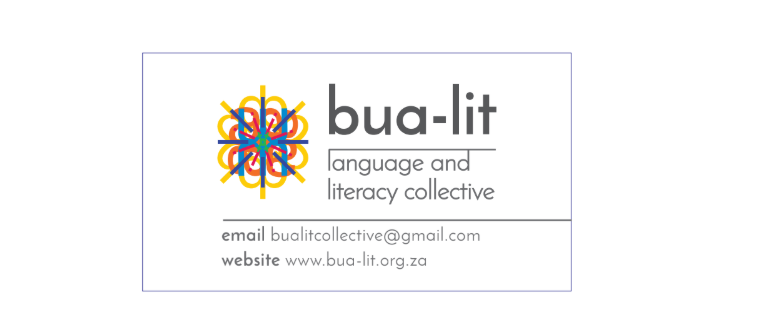A glimpse into language, literacy and social justice in South Africa
- Firdous de Villiers
- Jul 25, 2025
- 4 min read
Firdous de Villiers, University of the Western Cape, South Africa

The bua-lit language and literacy collective was established in 2018 to share knowledge and resources about multilingual language and literacy education in South Africa. The collective consists of language and literacy researchers, activists, educators and teacher educators. The name of the collective draws inspiration from the pioneering work in multilingual education of the National Language Project who produced a publication called Bua! In the 1990’s. “bua” is Setswana, one of the official languages of South Africa, for “speak” and/or “speak out”. And “lit” for literacy. In other words, bua-lit is a collective that is committed to speaking out about literacy.
Drawing on a wide range of scholarship from South Africa and internationally, the collective aims to:
explain what it means to be literate, beyond skills, and the many pathways to becoming successfully literate in schooling and higher education;
show the implications of a complex approach to literacy for standardised assessments;
explore approaches to curriculum and language in education policy that build on the resources South African children bring with them to schooling;
put forward strategies for change.
The bua-lit language and literacy collective works to challenge the narrow skills-based view of literacy and puts forward ideas about how language and literacy can be viewed, practiced and taught. The collective has produced a paper on their position which can be read on the bua-lit website or downloaded here.
The bua-lit website also houses the bua-lit blog which is updated with posts about current events surrounding language, language policy, literacy, and multilingual literature. Some recent highlights on the blog include the public education pamphlets developed by bua-lit, the Free to Learn Documentary and the free online course offered by the collective.

Public Education Pamphlets
In 2024, the bua-lit language and literacy collective partnered with the Zenex Foundation to produce a set of four pamphlets. The pamphlets were launched at International Mother Language Day celebration, where the South African Department of Basic Education announced Mother Tongue Based Bilingual Education to be rolled out in starting in Grade 4 in 2025.
These pamphlets include information about bi/multilingual education for the South African public. The pamphlets cover the following topics:
What is bi/multilingual education?
What is mother tongue based bi/multilingual education?
Developing a school language policy.
Translanguaging
The pamphlets are free to download on the bua-lit website and are available in eleven of the official languages of South Africa.

Free to Learn: Soze Ungayibambi! Documentary
Towards the end of 2024, bua-lit, the Centre for Multilingualism and Diversities Research (CMDR) at the University of the Western Cape and the Zenex Foundation launched the “Free to Learn: Soze Ungayibambi!” documentary directed by Kate Ahrends. Free to Learn showcases the work of two projects housed in the CMDR in collaboration with colleagues from the School of Education, University of Cape Town. The film highlights innovative work by students, teachers and researchers where language resources are employed in school classrooms to get learning done bilingually. The documentary brings attention to the challenges faced by students who learn in English only. Additionally, the documentary illustrates difference in confidence when students have access to content in their own language in addition to English.
Find the documentary here on YouTube

Getting Started with Mother Tongue Based Bilingual Education (MTBBE) Online Course
In April 2025, the bua-lit collective released a free online course Getting Started with MTBBE to provide district officials, teachers, parents and anyone interested with basic knowledge and teaching strategies for introducing MTBBE in classrooms. The course features a mixture of short video discussions between education experts, PowerPoint presentations and short texts to read. At the end of each section, participants take a quiz which helps unpack ideas learnt and solidify understanding. This course sets out to legitimise the bilingual strategies that are already unofficially being used in classrooms across South Africa.
The course takes three hours to complete, and participants receive a certificate of completion at the end. The certificate can be downloaded to show that participants have passed the course and are equipped to support the introduction of MTBBE in their schools. The Getting Start with MTBBE course was endorsed by the Department of Basic Education.
All three of the abovementioned projects by the bua-lit language and literacy collective aim to support the roll out of Mother Tongue Based Bilingual Education (MTBBE) in South Africa. Currently, South Africa has twelve official languages, however, the majority of schooling takes place in English only even though a majority of children in South Africa have an African language(s) as their most familiar language or their mother tongue. The launch of MTBBE in South Africa means learning and teaching support materials (for example textbooks) will now be available in two or more languages. In the South African education system, where Afrikaans and English learners have benefitted the most from the use of their mother tongue as languages of learning and teaching beyond Grade 3, MTBBE is a response to the historical language and educational inequalities. For examples of MTBEE implementation see the public education pamphlet here.

Firdous de Villiers is a second-year master's student in Linguistics at the University of the Western Cape in South Africa. She is a scholar of the Mellon Foundation with membership to its affiliated Social Science Research Council. Her research interests include language policy, language attitudes and bi/multilingualism in higher education. Firdous is currently a research intern at the bua-lit language and literacy collective.




